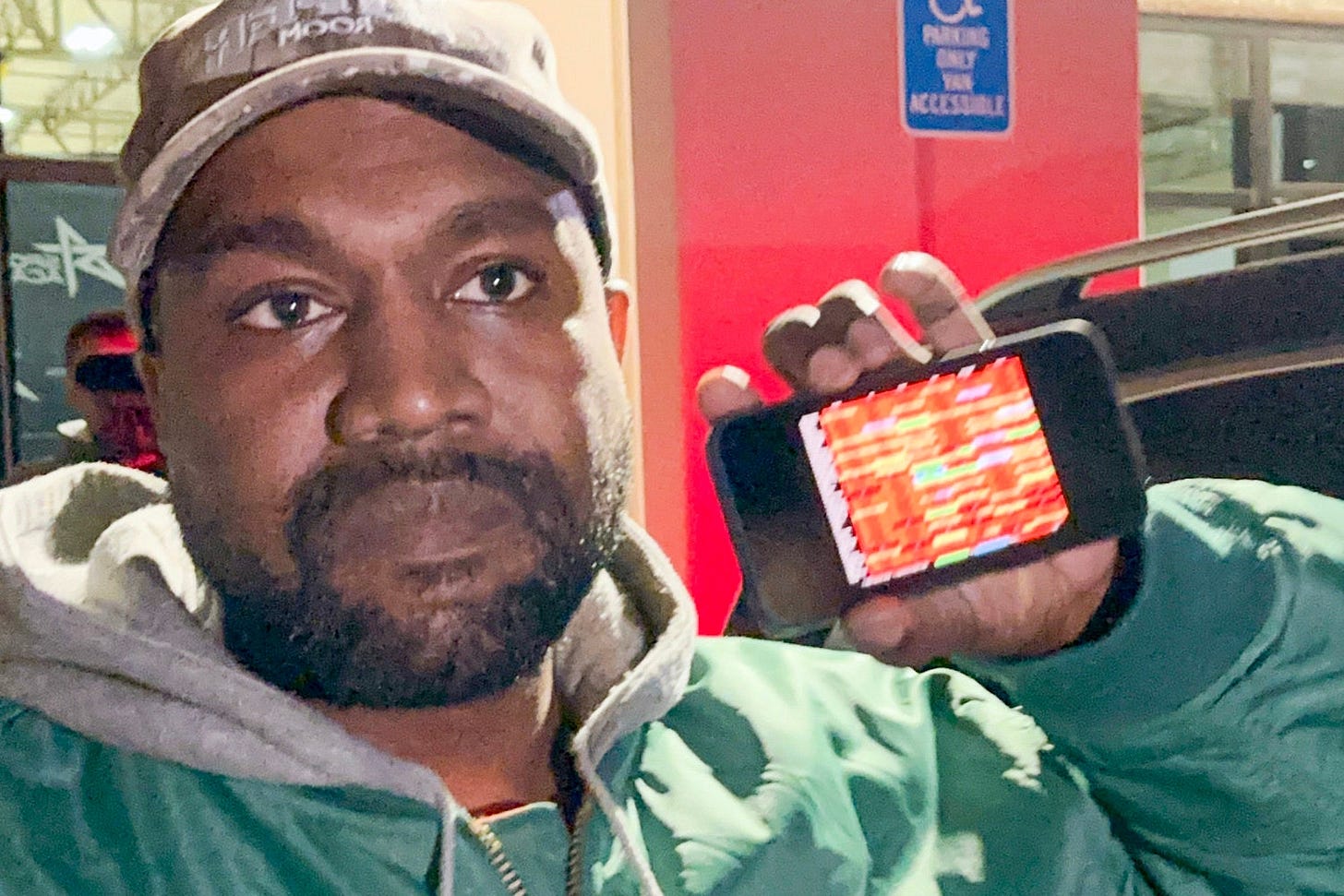It’s been hard to resist sharing my perspective on the Kan/Ye controversies of the past months, but it seemed as though every time I would sit down to write, a new development would unfold and shake everything up. Things have been erratic, to say the least.
As of writing, this has been the timeline:
Early October, 2022: Kanye ignites public outrage with numerous antisemitic comments.1
Nov. 18: Kanye is spotted leaving a hotel with Milo Yiannopoulos.
Nov. 20: Kanye is spotted in his Beverly Hills studio with Nick Fuentes. He tells reporters about plans to repeat his 2020 presidential bid in 2024.
Nov. 22: Kanye, Milo, and Fuentes (among others) have dinner with Trump at Mar-a-Lago, during which Kanye asks Trump to be his running mate. The meeting is later disavowed by Trump.
Nov. 28: Kanye, Milo, and Fuentes give their first major public appearance on Tim Pool’s podcast. The interview consisted of incoherent ramblings and ended with Kanye abruptly walking out after some mild, anticipated pushback by Tim.
Dec. 1: Kanye and Fuentes have a three-hour long discussion with Alex Jones on InfoWars. (Since-disgraced pedophile Ali Alexander and Laura Loomer also make appearances.) Jones later claims the meeting was a “setup,” but allows Fuentes a subsequent interview.
Dec. 4: Milo is fired from YE24, blaming Fuentes.
Kanye disappears for months and the campaign stalls. He gets married in January. Fuentes continues his daily show in early January after excitedly putting it on pause. While masking the obvious inactivity with claims of confidential things “in the works,” Fuentes eventually lets out the truth on a few scattered occasions. Students for Ye tweets an amusing video plea for YE24 to go on.
Mar. 25: Kanye apparently forgives Jews in an Instagram post after watching 21 Jump Street starring Jonah Hill.
May 4: Milo usurps Nick as head of YE24; Nick’s demoted to an “unpaid remote advisor” as Kanye loses interest in him.
Jun. 2: It’s reported that Kanye is hiring a Jewish businessman as CEO of Yeezy, beautifully contradicting everything in the past nine months.
And to think that YE24 proponents discounted claims of poor mental health as the desperate inventions of a Jewish doctor and media!
As many of us expected from the start, Kanye seemingly got bored of politics and his antisemitic shtick after only a few months. What nobody could foresee, however, was his fascinating graduation from antisemitic mania to what can only be described as a rising philosemitic depression. Additionally, Kanye has gone from waxing pious and being hailed a Christian martyr by his sycophants to holding pornographic raves featuring Christian iconography. (Back to normal, in other words…)
But the image of Kanye the Saint is not the only thing his fanboys on the Right have intentionally fabricated for their own ends. Enough time has finally passed to review these past events and sort out fact from fiction. Sure enough, there’s far more of the latter than the former, and it’s important to set the record straight going forward.
Kanye De-Banked
The first big lie we were told had to do with the termination of Kanye’s bank account at JPMorgan. Surprisingly, this idea originated not with Nick Fuentes or any of the usual suspects, but with the woman Kanye wore his White Lives Matter shirt next to, Candace Owens. In a still-not-deleted Tweet posted two days after the “death con” comment, Owens shared the bank’s notice of their decision, adding that “[w]e have reached extremely frightening times in this country.”
But multiple outlets quickly clarified the situation: the undated notice Candace posted was issued on September 20, weeks before the recent spectacle. As we’ll see with other alleged “cancellations,” there’s a history, here.
According to the above sources:
[T]he letter was actually sent in response to West's interview with CNBC last month, in which he announced his intention to stop banking with JPMorgan while also railing against his corporate partnerships with Gap and Adidas.
West took to Instagram to share screengrabs of JPMorgan Chase's and Adidas' executive board, as some executives at the bank are also on the sportswear giant's supervisory board.
He also briefly changed his Instagram profile image to an upside-down photo of JPMorgan Managing Director and Vice Chairman Jing Ulrich, before changing it to a snapshot of Adidas creative director Alasdhair Willis, son-in-law of Paul McCartney.
A screenshot shared on the Twitter account of financial meme account Litquidity last month showed West complaining about not being able to get one-on-one time with the bank's top executives.
"I MOVED 140 MILLION DOLLARS TO CHASE AND BILL [GROUS] STILL NEVER PUT JAMIE [DIMON] ON CALL OR IN A MEETING WITH ME," read the post.
Better yet, on TimCast Kanye reiterated this exact version of events:
I moved $140 million into JPMorgan, and I said I want to talk to Jamie Dimon — like, look at me, I’m just going in naive, you know, multi-billionaire like maybe Jamie Dimon will let me in on some deal flow — wrong… And I’m just like, banging my hands like, “I wanna meet with Jamie,” and I start complaining online, and then they de-bank me, for complaining.
So it’s that simple: Kanye was being more petulant than usual, actively denigrating his bank’s reputation to his followers, announcing plans to switch to another bank, and so JPMorgan made it easier for him by preemptively cutting ties — all before he’d expressed any antisemitism.
But that’s not how his fanboys took it. No, even after Kanye himself admitted this to the world, the prevailing narrative of the Groypers was that this was just the first of many ways that the Jews crushed the poor Christian for questioning their immense power. It was all too seductive a tale: Kanye was “de-banked,” they say, and we all know who’s in charge of those. (Despite the fact that neither Jamie Dimon nor almost any of the other JPMorgan executives are Jewish.2)
As Nick Fuentes put it on his show:
Today, Kanye, as part of the continued fallout from his comments on social media over the weekend, has been banned from JP Morgan Chase — de-banked. … He was banned from a bank! A bank closed his checking account and terminated their relationship because he tweeted about Jews, ok? Think about it. You know who else this has happened to? Me! …
What’s the one thing — the one thing — that a $6 billion rap fashion mogul, a black guy, would have in common with me, a white political livestreamer? Especially in the last three days, what’s the one thing we both have in common? We both talk about Jews. …
If you’re getting banned for saying that somebody has all the power, if you’re being ostracized from, punished by the financial and media institutions of the country for saying that a certain entity runs that country, it doesn’t prove definitively that you’re right, but it’s a pretty good heuristic that you probably are … it’s a pretty safe bet. …
I’ve been looking for the people that are going to tell me I’m wrong. A lot of people have told me bad things will happen to you. A lot of people have told me you can’t say that, you shouldn’t say that, saying that is too provocative, saying that will not help you with your career. I’ve never heard anybody tell me I’m wrong.
He’s wrong.
Moreover he continued to be wrong, deliberately, months and months after the fact and all while knowing better. Not only is he wrong on a factual level, the self-styled Christian is an inveterate liar. Nor did his followers and cronies care: Kanye’s “de-banking” has generally been the first thing Groypers will bring up when describing the saga, and it’s a myth.
Persecution: Real & Imagined
Let’s leave all that aside: of course this wasn’t the only “cancellation.” Fuentes gives a mountain of other examples on his Telegram, the sheer size of which is intended to prove without a doubt the severity of Jewish power (and Jewish vindictiveness):
Yet once you knock off JPMorgan Chase from the list, it doesn’t take long to notice just how much he’s scraping the bottom of the barrel.
You’ll notice Gap is listed, another frequently mentioned cancellation — except Gap cut ties back in September in a move initiated by Kanye himself.
You’ll notice the canceled concert at Sofi Stadium, which, according to Sofi, was never scheduled in the first place, and at any rate would have been in reaction to the “White Lives Matter” drama as it predated Kanye’s antisemitic outbursts.
Or being banned from Skechers, which really means being escorted out from one of their stores after making a scene and breaking company rules.
Or there’s Def Jam, whose relationship with Kanye expired all the way back in 2021.
Or the Fox News “ban” which, I assume, is a creative interpretation of simple disapproval by Fox hosts.
One could go on, and on, tallying all of Fuentes’ wild exaggerations. But disregarding the lies, even if the mountain turns out to be more of a molehill, it’s undeniable that Kanye’s comments did engender backlash from the worlds of business and media. Adidas, for example, is the paragon of such persecution.
Gap and Adidas together contributed the lion’s share of Kanye’s net worth, totaling $6.6B in 2021. But in recent years he’d made it increasingly clear that the creative burden of the brands was exceeding their financial value to him. Indeed, in the month before his antisemitic remarks, Kanye expressed a desire to break from all his big corporate entanglements.
From a Sept. 12 Bloomberg article:
Rapper and designer Kanye West, who now goes by Ye, says he’s done with his corporate partners and plans to branch out solo.
“It’s time for me to go it alone,” Ye said in a phone interview. “It’s fine. I made the companies money. The companies made me money. We created ideas that will change apparel forever. Like the round jacket, the foam runner, the slides that have changed the shoe industry. Now it’s time for Ye to make the new industry. No more companies standing in between me and the audience.”
Even with billions of dollars in revenue and two of the fashion industry’s most lucrative royalty deals at stake, Ye has shown full willingness to publicly battle the very same corporations he’s worked most closely with …
Adidas, one of Ye’s longest tie-ups, manufactures and distributes Yeezy’s footwear. He’s had longstanding disagreements about how the line has been managed, especially in times where he hasn’t been consulted on planning and strategy. The latest row was over an Adidas slide design that looked similar to a Yeezy style. He said it was “blatant copying.” …
Ye said he joined Gap in the first place because he wanted to sell his designs at a more affordable price — something they accomplished. He has complained of not being included in meetings and being shrugged off by management.
“Every step of my career there was something in the way,” said Ye. “They did the dream, but just without Ye.”
Ye has also been at odds with his bank JPMorgan Chase & Co., where he had moved his money earlier. On Instagram, he criticized executives Bill Grous at JPMorgan’s wealth management business, investment banking Vice Chair Jing Ulrich and Chief Executive Officer Jamie Dimon. He said he couldn’t get the CEO on the phone or any deal flow.
So in the month before controversy broke, Kanye was having serious disagreements with Adidas, Gap, and JPMorgan, and planning to break away from all three. Later that month, sure enough, Gap and JPMorgan were out, and the relationship with Adidas looked like it was next. But that’s not all.
Kanye’s bipolar personality and unceasing provocations simply were not compatible with corporate life. Internally, Adidas’ concerns date back at least to 2018 after his “slavery was a choice” comments.
Employees raised concerns to executives about Mr. West’s behavior after the artist appeared on TMZ in early 2018 saying that slavery “sounds like a choice,” former employees said. … In October 2018, Adidas executives conducted a deep dive of the Yeezy partnership that was presented to leaders based in Germany, including Mr. Rorsted. The presentation reviewed options for dealing with Mr. West, who was asking to be named creative director of Adidas, according to documents. … One proposal was running Yeezy as a stand-alone brand like Nike’s Jordan brand, which would limit Mr. West’s exposure to the rest of the company. Another option was buying the Yeezy trademark from Mr. West and running the brand without him, according to the documents. … Another proposal called “immediate mitigation” was to separate from Mr. West, sell off remaining Yeezy products and replace them with other revenue streams, including products from other celebrities, the documents show.
Clearly it wasn’t just his antisemitism that put public pressure on the company. And this isn’t just an inference; while Kanye kicked everything off with his “death con” tweet on Oct. 9, Adidas had already put their partnership with him “in review” for the first time just three days prior, seemingly in reaction to his disparaging of the brand and the incendiary White Lives Matter episode.
Further still, there were Kanye’s “intimidation tactics with the staff of his fashion empire that were provocative, frequently sexualized, and often directed toward women.” His characteristically degenerate and sex-addicted behavior apparently made him hell to work with, especially in a corporate setting. A Nov. 22 Rolling Stone exposé offers some pretty illustrative anecdotes. Based on an anonymous memo issued to Adidas and interviews with its authors, the piece notes that “Kanye’s problematic behavior started within the first year of his partnership with the Adidas brand.”
Some excerpts:
Former Yeezy and Adidas staffers and creative collaborators claim that he played pornography to Yeezy staff in meetings; discussed porn and showed an intimate photograph of Kim Kardashian in job interviews; and showed an explicit video and photos of Kardashian as well as his own sex tapes to Yeezy team members. …
“He showed me the video of Francesca Le, a buff porn star with a strap-on dildo fucking another girl in the ass,” the former collaborator tells Rolling Stone. “He’s like, ‘What do you think of it?’ Not laughing at all.” Two other creatives, including one associated with Yeezy’s early years, claim West had also shown them pornographic videos — including homemade sex tapes of West engaging in sexual activities with women. …
“We create products of passion. I literally want to fuck my shoes. That’s how good they are.” … [T]he employee recalls West making similar statements to colleagues about a shoe into which West or a Yeezy consumer could ejaculate — “not a sex-toy sneaker but something that you were so into that you would wanna have an intimate relationship” — at least 10 separate times. “He’d be, like, ‘literally fuck.’ He would be very clear on what that meant.” …
At times in 2020, though, things got “really uncomfortable,” says a former staffer who worked for Yeezy in Cody. The staffer alleges that West would do things like scream, jump on a table, and throw books across a room. “I feared for my well-being,” the former staffer says.
A few days after the employees’ memo, Adidas opened an independent investigation, although its results do not seem to be public yet. Nonetheless this behavior continued at least up until Oct. 10, when a secret recording of Kanye harassing Adidas officials with porn was released.
So looking back, we can trace three converging tensions which ultimately culminated in Adidas unilaterally disaffiliating on Oct. 25: 1. Kanye’s unrealistic business demands and calls for separation that led to the cutting of ties with Gap and JPMorgan, 2. the internal pressures among employees and litigation potential surrounding Kanye’s sexual antics, and 3. the external scrutiny around Kanye’s pro-white and anti-Jewish controversies. All these factors in combination caused Adidas’ leadership to feel it would be worth it to finally call it quits and look for opportunities elsewhere.
Why Do They Persecute Me So?
Let’s review the Groyper narrative one more time.
From the same monologue cited earlier, Fuentes argues essentially that Kanye was able to say anything at all except criticize Jews. Then and only then do the walls cave in.
He said White Lives Matter. He said the MAGA hat makes me feel like a superhero, and I’m gonna vote for Trump, and the 13th Amendment should be repealed, and blacks don’t have connections like Jews, and so on. And for years he was able to bank, use social media, interact with people. It wasn’t until literally Friday when he said “Jewish people are trying to intimidate me” that he got banned on Instagram. And it wasn’t until Saturday when he said “Jewish people blackball anybody that opposes their agenda; they invented cancel culture” until he got banned off Twitter. And after that he was banned from banks, seemingly for no reason, but coincidentally three days after he said that.
The examples he gives, though, are incredibly weak and pale in comparison to his recent anti-Jewish comments.
Kanye never said the 13th Amendment should be repealed, for example, rather tweeting (and reiterating the next day) that it should be fixed to remove its “except as a punishment for crime whereof the party shall have been duly convicted” clause. Secondly, his “Black people don’t have the same level of connections as Jewish people” comment only aroused controversy back in 2013 because it was seen as antisemitic, not anti-black; and yet there was no cancelation. But thirdly, and most relevantly, his “White Lives Matter” activism is what started this mess and put his partnership with Adidas in review in the first place.
This isn’t to deny that antisemitism was a significant cause of the financial blowback Kanye has faced. After all it was the first reason cited by Adidas in their Oct. 25 press release. And how much more blatant can it get? If you speak out against the Jews and face material consequences, is that not obvious vindication of what you were saying in the first place?
As anyone not hopelessly sucked into bias and narrative can easily see: no.
Corporate America’s hypersensitivity to all views that infringe the sacrosanct lines drawn around identities not deemed mainstream and oppressive is well-known. So-called wokeness is railed against by conservatives ad nauseam; is it any surprise that this rule of thumb applies to Jews, too?
If anything it would be truly surprising if it did not apply at least to some extent to a minority ethno-religious group with such a salient legacy of victimization by the majority, especially for a German company with a Nazi history like Adidas. And yet it seems as though any time antisemitism receives backlash, this is taken for evidence of total Jewish control. When Scott Adams had his entire career shut down overnight for controversial comments on race relations, was that evidence of black elites pulling the strings? Or better yet, what about when a similar thing happened to Roseanne Barr, a Jewish woman? Perhaps the final redpill is understanding that our ruling class isn’t simply Jewish, but also black, gay, trans, immigrant, Muslim, afflicted with Leukemia and severely mentally retarded.
This is all basic stuff, or it should be. But while there may be little difference in substance, there’s still a critical difference in narrative that can make it confusing for people and blind them to the obvious. Antisemitism is most often a claim made about elites, turning it into a kind of self-fulfilling prophecy when it faces inevitable pushback in a way that anti-black racism cannot. Even if the nature of the pushback toward both may be the same, a compelling narrative is only reinforced if you’re accusing the group of being too powerful: “To learn who rules over you, simply find out who you are not allowed to criticize.”3
Jewish Power
But Jews are also much more well-represented among influential elites who make these kinds of decisions than blacks are. Based on this fact alone, it wouldn’t necessarily be unfair to assume that Jewish sensibilities would generally be taken care of more swiftly than those of blacks. But the thing is that even disregarding all the lies that have been told about Kanye, there doesn’t seem to be any indication that the backlash he faced was unusually severe. For a public figure of his status who threatens “death con” (a misspelling that betrays his actual understanding of the term) on Jewish people and who repeatedly emphasizes his love for the architect of their genocide (while also denying said genocide on InfoWars), it is perfectly expected that non-Jewish business leaders like those at Adidas would want to dissociate, even if that meant taking an immediate hit.
Not only have the Groypers deliberately distorted both Kanye’s character and persecution beyond recognition, the same is done for Jewish overrepresentation or so-called Jewish power. The biggest meme to come out of YE24 hands down has been the “Who Controls Your Mind?” infographics. The 2013 version was introduced by Kanye to paparazzi as “the Red Media”; eventually Fuentes and his followers updated it for 2023.
Except, obviously, both tables are completely inaccurate (not that anybody cared). For reference, Lucien Wolf exhaustively scrutinizes the version tweeted by Fuentes in a YouTube video; I set forth a more accurate picture in a previous article.

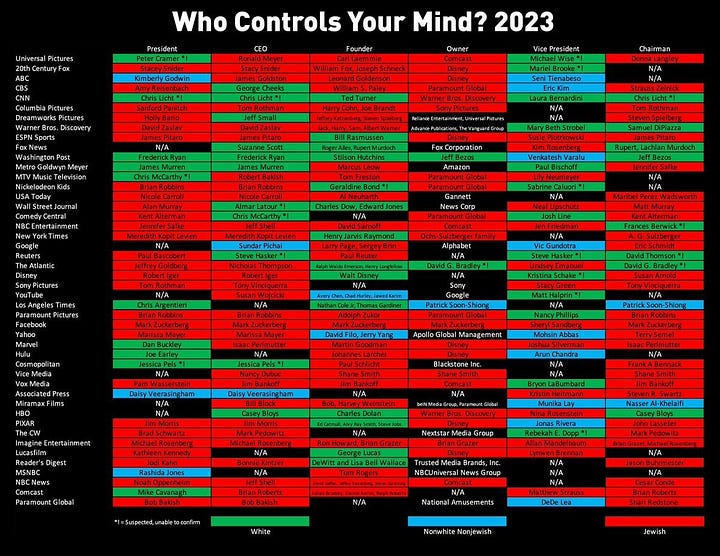
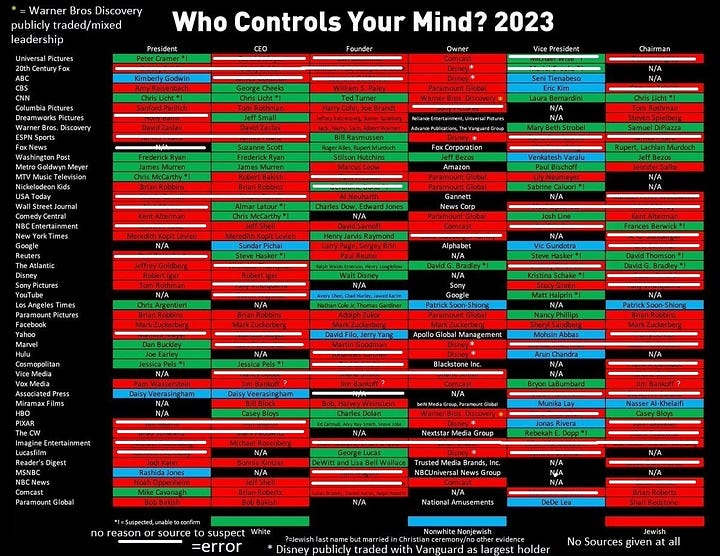
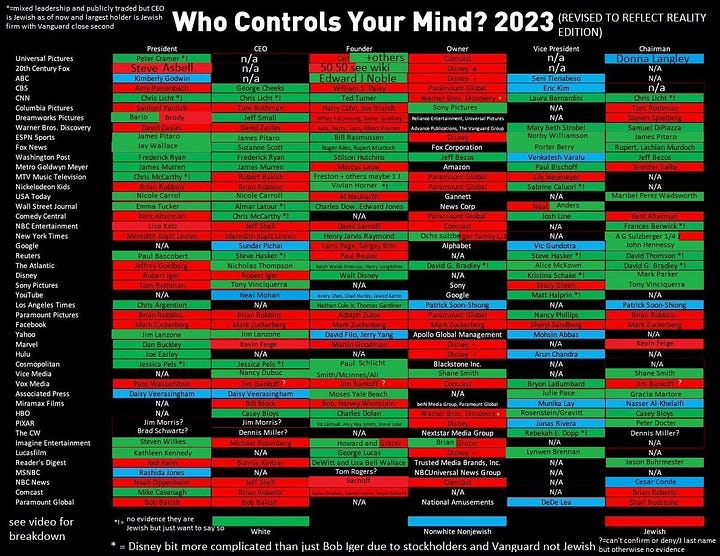
This is probably the clearest insight as to what’s going on here. The alleged proof of the Jewish stranglehold on American media wasn’t merely inaccurate; the image is so extremely falsified that it’s absolutely clear its anonymous creator knew exactly what he was doing and simply didn’t care. And it necessarily follows, then, that he also must have recognized how unspectacular the Jewish media presence really is, or else he wouldn’t have been compelled to lie in the first place.
This logic applies elsewhere. Every lie wittingly told by Nick Fuentes and friends can be seen as an implicit admission of the deficiency of their own argument. More broadly, the fact that wholesale fabrications continue to be part and parcel of antisemitic propaganda, as they are, means that plenty of antisemites are well aware that the case they could rationally argue is fairly unimpressive by itself. Why else would such things be needed? Just tell the truth, if it’s so damning.
And “unspectacular” is, of course, a relative term. As my assessment concludes, the overrepresentation of ethnic Jews in American media is still significantly disproportionate: while comprising between 2–5% of the broader population depending on how you count, they represent maybe a third of the highest leadership positions and maybe a fifth of influential news executives. Similar things can be said for finance, government, entertainment, science, the arts, philanthropy, etc.; Jewish overrepresentation, much like an emerging substantial Asian overrepresentation, is a fact of American life and has been since at least the 1960s. And there are rational conversations that should be freed from stigma about both the causes of this phenomenon and the effect it has on our society.
But Kanye did not spark such a conversation, and despite the attempts to construe his prattle as the expression of legitimate concerns by Groypers, that’s not what he was even looking to do. Instead Kanye was projecting the feelings of constraint seen in his business engagements onto a familiar Jewish target, probably compounded by his fringe religious views. Rather than anything rational or at least understandable, he chose to claim that his Jewish doctor maliciously misdiagnosed him, that random Jewish agents or record label owners were holding blacks in a second slavery, that his wife’s promiscuity was the product of “Jewish Zionists” in the media, etc. Jewishness was just totally irrelevant to most of Kanye’s scattered complaints, causing everyone from Tim Pool to Piers Morgan to wonder why he couldn’t seem to keep the word “Jewish” out of his mouth — less because it was taboo than because it was illogical and confusing. Kanye would never clarify, preferring to storm out of the studio as he did with Tim Pool. Can anyone really believe that this did anything but reinforce the preconceptions the public had of antisemitism as wrong factually and ethically, as hate-based rather than fact-based? If this is the man venerated by the country’s leading antisemitic voices, can anyone blame them?
To the Jew-baiters who leeched off Kanye as soon as they could bite, their antisemitism preempting their race hatred as always, Kanye West is propagandized as a faithful Christian against the Jews, a suffering servant speaking truth to an overwhelmingly Jewish system and paying for it dearly. As has been demonstrated, the truth is the opposite: Kanye has instead been a lecherous schizophrenic largely discrediting antisemitism with baseless, petty grievances and facing an expected, albeit wildly hyperbolized, backlash from gentile-run businesses. For months Nick Fuentes exploited Kanye as a vehicle to advance an agenda of blind antisemitism. Far more than spread an ideology or articulate a point, he willingly and repeatedly disregarded truth to the extreme simply with the goal of generating as much hatred against Jewish people as possible. And while it appears as though Kanye has turned his back on him for good, Fuentes likely feels this goal was achieved.
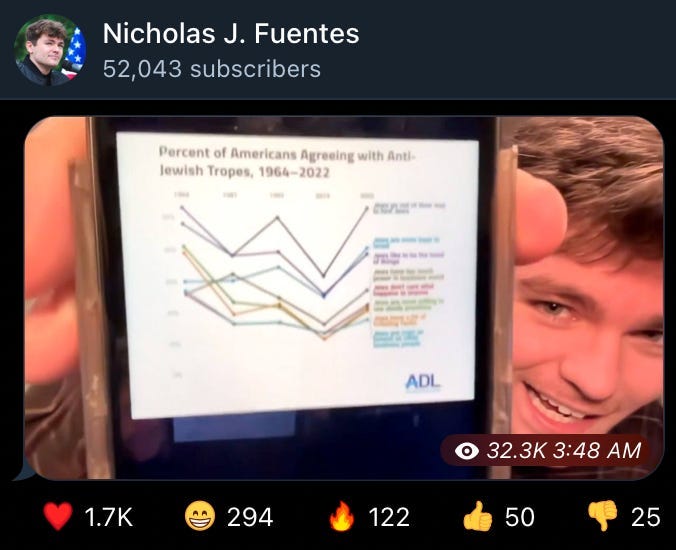

Whatever the case, whatever the outcome of this debacle, it’s necessary to take the time to bring all of it out into the light. The past is set in stone and the passing of time reveals the truth. This whole ordeal will always be a perfect example of Nick Fuentes’ integrity and is something he needs to be actively confronted about; it would be a shame for our own purposes to forget it. His own amusingly paradoxical antisemitism I’d love to write about as well, but that will have to be for another time. Until then.
The initial events go like this:
On Oct. 3, Kanye wears a “White Lives Matter” shirt with Candace Owens at his Paris fashion show; this is what starts the media frenzy and first earns him attention. He gives an initial hint at the things to come with comments (vague enough to be suspicious) about Jared Kushner in his interview with Tucker Carlson airing Oct. 6. Sure enough, the next day he posts texts with P. Diddy on Instagram in which he claims Diddy’s alleged Jewish handlers are behind him objecting to the White Lives Matter stunt; the day after, Instagram locks his account. Then on Oct. 9, Kanye famously tweets out “I’m going death con 3 On JEWISH PEOPLE,” prompting Twitter to lock his account the following day, too.
Dimon is often assumed to be Jewish because his last name sounds like “Diamond,” but it was actually a name taken by his grandfather, a Greek immigrant. There’s also a claim that he married a Jewish woman, but there’s no reputable indication Judith Kent is Jewish — not that it would matter either way.
You can also see from the JP Morgan website that very few people involved in the company’s leadership appear to be Jewish, and its founder was an Englishman.
In case any reader is still unaware, this quote is misattributed to Voltaire and likely actually has its origin with prolific neo-Nazi and convicted pedophile Kevin Alfred Strom.







